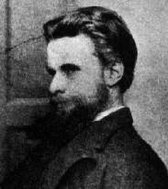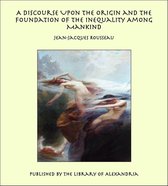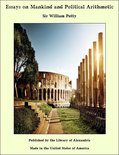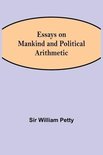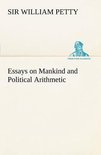Essays on Mankind and Political Arithmetic Ebook Tooltip Ebooks kunnen worden gelezen op uw computer en op daarvoor geschikte e-readers.
Afbeeldingen
Artikel vergelijken
- Engels
- E-book
- 9781465640697
- 16 maart 2020
- Adobe ePub
Samenvatting
William Petty, born on the 26th of May, 1623, was the son of a clothier at Romsey in Hampshire. After education at the Romsey Grammar School, he continued his studies at Caen in Normandy. There he supported himself by a little trade while learning French, and advancing his knowledge of Greek, Latin, Mathematics, and much else that belonged to his idea of a liberal education. His idea was large. He came back to England, and had for a short time a place in the Navy; but at the age of twenty he went abroad again, and was away three years, studying actively at Utrecht, Leyden, and Amsterdam, and also in Paris. In Paris he assisted Thomas Hobbes in drawing diagrams for his treatise on optics. At the age of twenty-four Petty took out a patent for the invention of a copying machine. It was described in a folio pamphlet “On Double Writing.” That was in 1647, in Civil War time, and although Petty followed Hobbes in his studies, he did not share the philosopher’s political opinions, but held with the Parliament. In 1648 he added to his former pamphlet a “Declaration concerning the newly invented Art of Double Writing.” Samuel Hartlib, the large-hearted Pole, who in those days spent his worldly means in England for the advancement of agriculture and of education, and other aids to the well-being of a nation, had caused Milton to write his letter on education, as has been shown in the Introduction to the hundred and twenty-first volume of this Library, which contains that Letter together with Milton’s Areopagitica. Young Petty’s first published writing was a Letter to Hartlib on Education, entitled “The Advice of W. P. to Mr. Samuel Hartlib for the Advancement of some Particular Parts of Learning.” This appeared in 1648, when Petty’s age was twenty-five, and its aim was to suggest a wider view of the whole field of education than had been possible in the Middle Ages, of which schools and colleges were then preserving the traditions, as they do still here and there to some extent. This pamphlet has been reprinted in the sixth volume of the “Harleian Miscellany.” William Petty wished the training of the young to be in several respects more practical. His own activity of mind caused him to settle at Oxford, where he taught anatomy and chemistry, which he had been studying abroad. He had read with Hobbes the writings of Vesalius, the great founder of modern practical anatomy. In 1649 William Petty graduated at Oxford as Doctor of Medicine, obtained a fellowship at Brasenose, and practised. In 1650 he surprised the public by restoring the action of the lungs in a woman who had been hanged for infanticide, and so restoring her to life. Dr. Petty now took his place at Oxford among the energetic men of science who had been inspired by the teaching of Francis Bacon to seek knowledge by direct experiment, and to value knowledge above all things for its power of advancing the welfare of man. The headquarters of these workers were at Oxford, and in London at Gresham College. In 1650 Petty was made Professor of Anatomy at Oxford, and it is a characteristic illustration of his great activity of mind that he was at the same time Professor of Music at Gresham College. Music had then a high place in the Seven Sciences, as that use of regulated numbers which expressed the harmonies of the created world. The Seven Sciences were divided into three of the Trivium, and four of the Quadrivium. The three of the Trivium concerned the use of speech; they were Grammar, Rhetoric, and Logic. The four of the Quadrivium concerned number and measure; they were Arithmetic, Geometry, Music; and Astronomy, which led up straight to God. Advance to Music might be represented in the student’s mind by his reaching to a sense of the harmonious relation of all his studies, which, so to speak, lived in his mind as a single well-proportioned thought.
Productspecificaties
Inhoud
- Taal
- en
- Bindwijze
- E-book
- Oorspronkelijke releasedatum
- 16 maart 2020
- Ebook Formaat
- Adobe ePub
- Illustraties
- Nee
Betrokkenen
- Hoofdauteur
- William Petty
- Hoofduitgeverij
- Library Of Alexandria
Lees mogelijkheden
- Lees dit ebook op
- Android (smartphone en tablet) | Kobo e-reader | Desktop (Mac en Windows) | iOS (smartphone en tablet) | Windows (smartphone en tablet)
Overige kenmerken
- Studieboek
- Nee
EAN
- EAN
- 9781465640697
Je vindt dit artikel in
- Categorieën
- Taal
- Engels
- Beschikbaarheid
- Leverbaar
- Beschikbaar in Kobo Plus
- Beschikbaar in Kobo Plus
- Boek, ebook of luisterboek?
- Ebook
Kies gewenste uitvoering
Prijsinformatie en bestellen
De prijs van dit product is 4 euro en 99 cent.- E-book is direct beschikbaar na aankoop
- E-books lezen is voordelig
- Dag en nacht klantenservice
- Veilig betalen
Alle bindwijzen en edities (7)
-
4,99Direct beschikbaar
-
2,49Direct beschikbaar
-
16,992 - 3 weken
Levertijd
We doen er alles aan om dit artikel op tijd te bezorgen. Het is echter in een enkel geval mogelijk dat door omstandigheden de bezorging vertraagd is.
Bezorgopties
We bieden verschillende opties aan voor het bezorgen of ophalen van je bestelling. Welke opties voor jouw bestelling beschikbaar zijn, zie je bij het afronden van de bestelling.
Tooltip -
8,992 - 3 weken
Levertijd
We doen er alles aan om dit artikel op tijd te bezorgen. Het is echter in een enkel geval mogelijk dat door omstandigheden de bezorging vertraagd is.
Bezorgopties
We bieden verschillende opties aan voor het bezorgen of ophalen van je bestelling. Welke opties voor jouw bestelling beschikbaar zijn, zie je bij het afronden van de bestelling.
Tooltip -
14,992 - 3 weken
Levertijd
We doen er alles aan om dit artikel op tijd te bezorgen. Het is echter in een enkel geval mogelijk dat door omstandigheden de bezorging vertraagd is.
Bezorgopties
We bieden verschillende opties aan voor het bezorgen of ophalen van je bestelling. Welke opties voor jouw bestelling beschikbaar zijn, zie je bij het afronden van de bestelling.
Tooltip -
30,992 - 3 weken
Levertijd
We doen er alles aan om dit artikel op tijd te bezorgen. Het is echter in een enkel geval mogelijk dat door omstandigheden de bezorging vertraagd is.
Bezorgopties
We bieden verschillende opties aan voor het bezorgen of ophalen van je bestelling. Welke opties voor jouw bestelling beschikbaar zijn, zie je bij het afronden van de bestelling.
Tooltip -
26,992 - 3 weken
Levertijd
We doen er alles aan om dit artikel op tijd te bezorgen. Het is echter in een enkel geval mogelijk dat door omstandigheden de bezorging vertraagd is.
Bezorgopties
We bieden verschillende opties aan voor het bezorgen of ophalen van je bestelling. Welke opties voor jouw bestelling beschikbaar zijn, zie je bij het afronden van de bestelling.
Tooltip
Rapporteer dit artikel
Je wilt melding doen van illegale inhoud over dit artikel:
- Ik wil melding doen als klant
- Ik wil melding doen als autoriteit of trusted flagger
- Ik wil melding doen als partner
- Ik wil melding doen als merkhouder
Geen klant, autoriteit, trusted flagger, merkhouder of partner? Gebruik dan onderstaande link om melding te doen.
